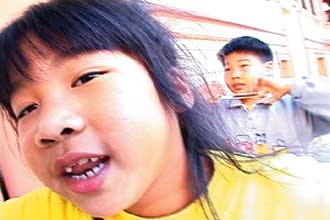This site narrows down even more the idea of 'the community' - one could probably not find a greater lack of curiosity for others elsewhere on the Net. We find ourselves with Robin, in his neighbourhood. We come in contact with people, friends and acquaintances, we are witness to their everyday conversations and idle chatter, we live along with them, sometimes interested, at other times we would rather get away from there. No rigged up, exaggerated scenarios here. In the middle of endless car noise, emergency vehicle sirens in the background, all the attention goes to everyday events in the neighbourhood. A terribly limited perspective, that is not, of course, without danger. Certainly not in San Francisco, a city that is almost European. A real city, but also a city that is a chain of small communities. And a city that seems to have invented (digital) communication. Don't pay attention to what is happening elsewhere, you need your attention to be able to avert all the dangers in your own neighbourhood.
And so we hear of the different people and recurring events that, neatly packaged, tell us something of the life there. Opinion about some German tourists, the mortal danger of the crossing at the corner, the sympathetic handyman, Jeremiah the dishwasher at the restaurant bar, Lauren the car waxer who works his arse off.
The question is: how does Robin turn this into art? In theory it should not have to be a problem, for even Lauren knows: "Some people call me an artiste, you know what I am talking about." Was it not Flaubert who demonstrated (mainly in his four novellas) that it was precisely the most ordinary and sentimental events that could provide material for the best art? And was it not Andy Warhol who demonstrated that a simple use of the camera one just happens to have on hand is a match for true art? So, it is quite clear that we can place Robin in this artistic environment, in this artistic neighbourhood, this artistic community. An artistic 'neighbourhood' that calls for more than just a little talent. Robin makes a contemporary variant of traditional Paris café culture. In the thirties and forties of the 1900s, the French intellectuals and the cabaret singers put the café on the cultural agenda. And was it not in the sixties and seventies that the avant-garde New Wave filmmakers made sacred ground of these cafés once and for all? Here it is Robin who restores his neighbourhood restaurant/coffee bar Basta Pasta to where it all began: serving coffee - speciality, African blend - and washing the cups. Lauren says: "I come to work and get drunk." Robin does not think that what he himself does is work. He is right, it is simply totally relaxed atmospheric description that is enjoyable to watch. And you keep hoping those Asian children will turn up again in that camera, always searching here and there, that has been the hallmark for so long of alternative cinema and is still effective today.
- Paul Groot
